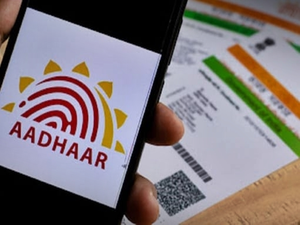New Delhi: The Supreme Court on Thursday observed that an Aadhaar card, which can be used to establish identity, is not, per see, proof of date of birth.
A bench of Justices Sanjay Karol and Ujjal Bhuyan was hearing an appeal filed by legal representatives of a deceased victim in a road accident challenging the reduction in award amount. The impugned decision reduced the award amount observing that the multiplier applicable would be 13, since the victim was aged 47 at the time of death, as per the Aadhaar card record. The claimant-appellants contended that the multiplier applicable would be 14 as the School Leaving Certificate recorded October 1970 as the date of birth of the deceased and he was 45 years old at the time of the accident.
In view of the contentions raised, the SC framed the legal question of which of the two is to be taken authoritative in case of conflict of the dates of birth between the School Leaving Certificate and the Aadhar Card. It noted that a School Leaving Certificate has been accorded statutory recognition under Section 94 of the Juvenile Justice (Care and Protection of Children) Act, 2015.
“The Unique Identification Authority of India, by way of its Circular No. 08 of 2023, has stated, in reference to an Office Memorandum issued by the Ministry of Electronics and Information Technology dated 20th December 2018, that an Aadhar Card, while can be used to establish identity, it is not per se proof of date of birth,” it said. After citing several decisions of diverse high courts across the country, the apex court concluded that it has “no hesitation” in accepting the calculation of the age of deceased based on the School Leaving Certificate.
Allowing the appeal, the SC ordered that the “total amount, i.e., Rs 14,41,500, in the interest of just compensation is rounded off to Rs 15,00,000 with 8 per cent interest from the date of filing of the claim petition to be released to the rightful claimants in the manner directed by the Tribunal”.
–IANS


Comments are closed.